Students must practice these TS Intermediate Maths 1A Solutions Chapter 2 Mathematical Induction Ex 2(a) to find a better approach to solving the problems.
TS Inter 1st Year Maths 1A Mathematical Induction Solutions Exercise 2(a)
Using Mathematical Induction prove each of the following statement for all n ∈ N.
Question 1.
12 + 22 + 32 + …………. + n2 = \(\frac{n(n+1)(2 n+1)}{6}\)
Answer:
Let S(n) be the given statement
12 + 22 + 32 + …………. + n2 = \(\frac{n(n+1)(2 n+1)}{6}\)
Since 12 = \(\frac{1(1+1)(2+1)}{6}\)
⇒ 1 = 1; the statement is true for n = 1
Suppose the statement is true for n = k then
(12 + 22 + 32 + ………….. + k2) + \(\frac{k(k+1)(2 k+1)}{6}\)
We have to prove that the statement is true for n = k + 1 also then
(12 + 22 + 32 + …………… + k2) + (k + 1)2
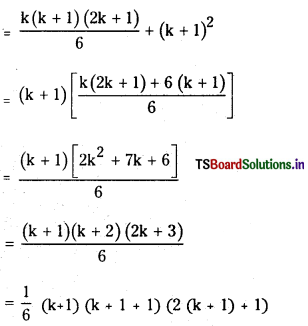
∴ The statement is true for n = k + 1 also.
∴ By the principle of Finite Mathematical Induction S(n) is true for all n ∈ N.
i.e., 12 + 22 + 32 + ……….. + n2 = \(\frac{\mathrm{n}(\mathrm{n}+1)(2 \mathrm{n}+1)}{6}\), ∀ n ∈ N
![]()
Question 2.
2.3 + 3.4 + 4.5 + ………………. upto n terms = \(\frac{n\left(n^2+6 n+11\right)}{3}\) (March 13, May 06)
Answer:
Let S(n) be the statement.
The nth term of 2.3 + 3.4 + 4.5 + …………… is (n + 1) (n + 2)
∴ 2 . 3 + 3 . 4 + 4 . 5 + …………….. + (n + 1) (n + 2)
= \(\frac{n\left(n^2+6 n+11\right)}{3}\)
Now S(1) = 2 . 3 = \(\frac{1\left(1^2+6+11\right)}{3}\) = 6
∴ The statement is true for n = 1.
Suppose that the statement is true for n = k, then 2.3 + 3.4 + 4.5 + …………….. + (k + 1) (k + 2)
= \(\frac{k\left(k^2+6 k+11\right)}{3}\)
Adding (k + 1) th term of L.H.S both sides
S(k + 1) = 2.3 + 3.4 + 4.5 + ……………. + k (k + 1) (k + 2) + (k + 2) (k + 3)
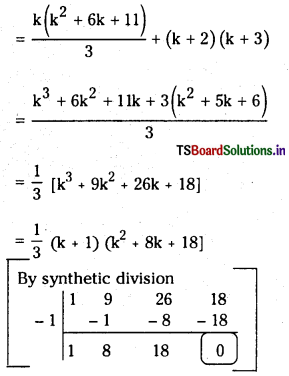
∴ S(k + 1) = \(\frac{1}{3}\) (k + 1) [k2 + 2k + 1 + 6 (k + 1) + 11]
= \(\frac{1}{3}\) (k + 1) [(k + 1)2 + 6(k + 1) + 11]
∴ The statement is true for n = k + 1
So by the principle of Finite Mathematical Induction S(n) is true ∀ n ∈ N
∴ 2 . 3 + 3 . 4 + 4 . 5 + ……………. + (n + 1) (n + 2) = \(\frac{n\left(n^2+6 n+11\right)}{3}\)
Question 3.
\(\frac{1}{1 \cdot 3}+\frac{1}{3 \cdot 5}+\frac{1}{5 \cdot 7}\) + ……………. + \(\frac{1}{(2 n-1)(2 n+1)}\) = \(\frac{n}{2 n+1}\) (May 2014)
Answer:
Let Sn be the statement
\(\frac{1}{1 \cdot 3}+\frac{1}{3 \cdot 5}+\frac{1}{5 \cdot 7}\) + ……………. + \(\frac{1}{(2 n-1)(2 n+1)}\)
Then S(1) = \(\frac{1}{1 \cdot 3}=\frac{1}{2(1)+1}=\frac{1}{3}\)
∴ S(1) is true.
Suppose the statement is true for n = k, then
S(K) = \(\frac{1}{1 \cdot 3}+\frac{1}{3 \cdot 5}+\frac{1}{5 \cdot 7}+\ldots .+\frac{1}{(2 k-1)(2 k+1)}\) = \(\frac{\mathbf{k}}{2 \mathbf{k}+1}\)
We have to show that the statement is true for n = k + 1 also,
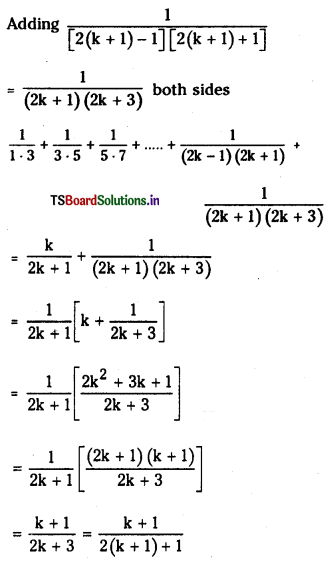
The statement S(n) is true for n = k + 1
∴ By the principle of Mathematical Induction S(n) is true for all n ∈ N.
∴ \(\frac{1}{1 \cdot 3}+\frac{1}{3 \cdot 5}+\frac{1}{5 \cdot 7}\) + ……………. + \(\frac{1}{(2 n-1)(2 n+1)}\) = \(\frac{n}{2 n+1}\)
![]()
Question 4.
43 + 83 + 123 + ………… + upto n terms = 16n2 (n + 1)2
Answer:
4, 8, 12, are in A.P. and nth term of A.P. is = a + (n – 1) d
= 4 + (n – 1) 4 = 4n
Let S(n) be the statement
43 + 83 + 123 + ……………… + (4n)3 = 16n2 (n + 1)2
Let n = 1, then
S(1) = 43 = 16 (1 + 1)2 = 64
∴ The statement is true for n = 1 also.
Suppose the statement is true for n = k then
43 + 83 + 123+ ……………… + (4k)3 = 16k2 (k + 1)2
We have to prove that the result is true for n = k + 1 also. Adding (k + 1) th term
= [4 (k + 1)]3 = [4k + 4]3 both sides
43 + 83 + 123 + ……………….. + (4k)3 + (4k + 4)3
= 16k3 (k + 1)2 + [4 (k + 1)]3
= 16 (k + 1)2 [k2 + 4k + 4]
= 16 (k + 1)2 (k + 2)2
= 16 (k + 1)2 [(k + 1) + 1]2
Hence the result is true for n = k + 1.
∴ By the principle of Mathematical Induction S(n) is true ∀ n ∈ N.
∴ 43 + 83 + 123 + ……………….. + (4n)3 = 16n2 (n + 1)2
Question 5.
a + (a + d) + (a + 2d) + ……………… upto n terms = \(\frac{n}{2}\) [2a + (n – 1) d]
Answer:
Let S(n) be the statement
a + (a + d) + (a + 2d) + + [a + (n – 1) d] = \(\frac{n}{2}\) [2a + (n – 1) d]
Now S(1) is a = \(\frac{1}{2}\) [2a + 0 (d)] = a
∴ S(1) is true.
Assume that the statement is true for n = k
∴ S(k) = a + (a + d) + (a + 2d) + ……………….. + [a + (k – 1) d]
= \(\frac{k}{2}\) [2a + (k – 1) d]
We have to prove that the statement is true for n = k + 1 also.
Adding a + kd both sides
a + (a + d) + ……………. + [a + (k – 1) d] + [a + kd]
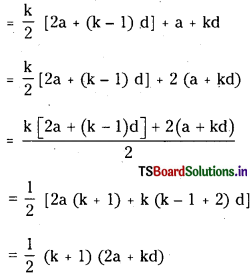
∴ The statement is true for n = k + 1 also
∴ By the principle of Mathematical Induction.
S(n) is true for all n ∈ N
∴ a + (a + d) + (a + 2d) + + [a + (n – 1) d] = \(\frac{n}{2}\) [2a + (n -1) d]
![]()
Question 6.
a + ar + ar2 + ………………… + n terms = \(\frac{a\left(r^n-1\right)}{r-1}\), r ≠ 1 (March 2011)
Answer:
Let S(n) be the statement
a + ar + ar2 + ………….. + arn – 1 = \(\frac{\left(\mathrm{r}^{\mathrm{n}}-1\right)}{\mathrm{r}-1}\), r ≠ 1
Then S(1) = a = \(\frac{a\left(r^1-1\right)}{r-1}\) = a
∴ The result is true for n = 1
Suppose the statement is true for n = k then
a + ar + ar2 + …………… + ar = \(\frac{a\left(r^k-1\right)}{r-1}\), r ≠ 1
We have to prove that the result is true for n = k + 1 also.
Adding ark both sides
(a + ar + ar2 + ………….. + ark – 1 + ark)
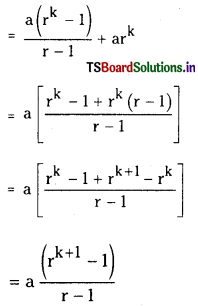
∴ The statement is true for n = k + 1 also
∴ By the principle of Mathematical Induction p(n) is true for all n ∈ N
a + ar + ar2 + ………………… + n terms = \(\frac{a\left(r^n-1\right)}{r-1}\), r ≠ 1
Question 7.
2 + 7 + 12 + ………. + (5n – 3) = \(\frac{n(5 n-1)}{2}\)
Answer:
Let S(n) be the statement
2 + 7 + 12 + ………. + (5n – 3) = \(\frac{n(5 n-1)}{2}\) = \(\frac{1(5-1)}{2}\) = 2,
Since S(1) = 2,
S(1) is true.
Suppose the statement is true for n k then
(2 + 7 + 12 + ………….. + (5k – 3) = \(\frac{k(5 k-1)}{2}\)
We have to show that S(n) is true for n = k + 1 also.
Adding (k + 1)th term 5 (k + 1) – 3 = 5k + 2 both sides
[2 + 7 + 12 + ……. + 5k – 3)] + (5k + 2)
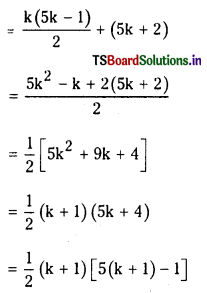
∴ S(n) is true for n = k + 1 also
∴ By the principal of Mathematical Induction
S(n) is true ∀ n ∈ N
∴ 2 + 7 + 12 + …………… + (5n – 3) = \(\frac{n(5 n-1)}{2}\).
![]()
Question 8.
\(\left(1+\frac{3}{1}\right)\left(1+\frac{5}{4}\right)\left(1+\frac{7}{9}\right) \ldots \ldots \ldots\left(1+\frac{2 n+1}{n^2}\right)\) = (n + 1)2 (March 2015-A.P)
Answer:
Let Sn be the statement
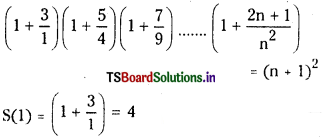
∴ S(n) is true for n = 1
Suppose Sn is true for n = k then
\(\left(1+\frac{3}{1}\right)\left(1+\frac{5}{4}\right)\left(1+\frac{7}{9}\right) \ldots \ldots\left(1+\frac{2 \mathrm{k}+1}{\mathrm{k}^2}\right)\)
= (k + 1)2 ………………. (1)
We have to prove that the statement is true for n = k + 1 also
(k + 1) th term is
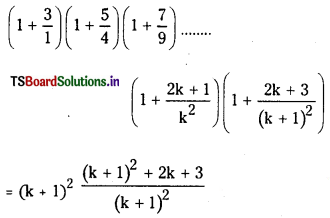
= k2 + 4k + 4
= (k + 2)2
∴ S(n) is true for n = k + 1 also
∴ By the principal of Mathematical Induction S(n) is true for ∀ n ∈ N
Question 9.
(2n + 1) < (n + 3)2
Answer:
Let S(n) be the statement
When n = 1, then 9 < 16
∴ S(n) is true for n = 1
Suppose S(n) is true for n = k
then(2k + 7) < (k + 3)2 …………….. (1)
We have to prove that the result is true for n = k + 1
i.e., 2(k + 1) + 7 < (k + 4)2
∴ 2 (k + 1) + 7 = 2k + 2 + 7 = (2k + 7) + 2 < (k + 3)2 + 2 (From (1))
= k2 + 6k + 9 + 2
= k2 + 6k + 11 < (k2 + 6k + 11) + (2k + 5)
= k2 + 8k + 16
= (k + 4)2
∴ S(n) is true for n = k + 1 also
By principle of Mathematical Induction
S(n) is true ∀ n ∈ N
![]()
Question 10.
12 + 22 + ……………. + n2 > \(\frac{n^3}{3}\)
Answer:
Let S(n) be the statement
When n = 1, then 1 > \(\frac{1}{3}\)
∴ S(n) is true for n = 1
Assume S(n) to be true for n = k then
12 + 22 + ……………. + k2 > \(\frac{k^3}{3}\)
We have to prove that the result is true for n = k + 1 also.
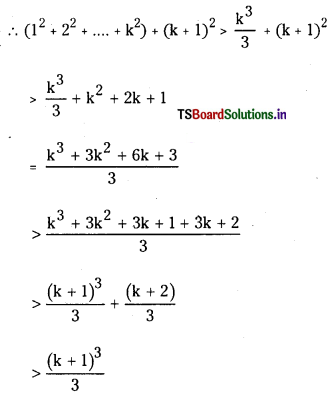
∴ S(n) is true for n = k + 1 also
∴ By principle of Mathematical Induction.
S(n) is true ∀ n ∈ N
Question 11.
4n – 3n – 1 is divisible by 9
Answer:
Let S(n) be the statement,
4n – 3n – 1 is divisible by 9
For n = 1, 4 – 3 – 1 = 0 is divisible by 9
∴ Statement S(n) is true for n = 1.
Suppose the statement S(n) is true for n = k
Then 4k – 3k – 1 is divisible by 9.
∴ 4k – 3k – 1 = 9t for t ∈ N ……………. (1)
We have to show that statement is true for n = k + 1 also.
From (1), 4k = 9t + 3k + 1
∴ 4k + 1 – 3 (k + 1) – 1 = 4 . 4k – 3 (k + 1) – 1
= 4 (9t + 3k + 1) – 3k – 3 – 1
= 4 (9t) + 9k
= 9 (4t + k) divisible by 9
(∵ 4t + k is an integer)
Hence, S(n) is true for n = k + 1 also.
∴ 4k + 1 – 3 (k + 1) – 1 is divisible by 9
∴ The statement is true for n = k + 1
∴ By the principle of Mathematical Induction.
S(n) is true for all n e K
∴ 4n – 3n – 1 is divisible by 9
Question 12.
3.52n + 1 + 23n + 1 is divisible by 17 (May 2012, 2008)
Answer:
Let Sn be the statement
3.52n + 1 + 23n + 1 is divisible by 17
S(1) is 3 . 52(1) + 1 + 23 (1) + 1
= 3 . 53 + 24 = 3 (125) + 16
= 375 + 16 = 391 is divisible by 17
Hence, S(n) is true for n = 1.
Suppose that the statement is true for n = k, then
3.52k + 1 + 23k + 1 is divisible by 17 and
3.52k + 1 + 23k + 1 = 17t for t ∈ N
then we have to show that the result is true for n = k + 1 also
Consider 3.52(k + 1) + 1 + 23(k + 1) + 1
= 3.52k + 1 . 52 + 23(k + 1) . 2
= (17t – 23k + 1) 52 + 23k + 3 . 2
= 17t (25) – 23k (50) + 23k (16)
= 17 t (25) + 23k (16 – 50)
= 17 t (25) – 34 23k
= 17 [25t – 23k + 1
25t – 23k + 1 is an integer.
∴ 3.52(k + 1) + 1 + 23 (k + 1) + 1 is divisible by 17.
∴ The statement S(n) is true for n = k + 1 also.
∴ By the principle of Mathematical induction S(n) is true for ∀n ∈ N
∴ 3.52n + 1 + 23n + 1 is divisible by 17
![]()
Question 13.
1.2.3 + 2.3.4 + 3.4.5 + ……………. upto n terms = \(\frac{n(n+1)(n+2)(n+3)}{4}\). (March 2015-T.S) (Mar. 08)
Answer:
The nth term of the given series is n (n + 1) (n + 2) and let Sn be the statement.
1.2.3 + 2.3.4 + 3.4.5 + ……………. + n (n + 1) (n + 2)
= \(\frac{n(n+1)(n+2)(n+3)}{4}\)
For n = 1
S(1) = 1.2.3 = 6
= \(\frac{1(1+1)(1+2)(1+3)}{4}\)
= \(\frac{2(3)(4)}{4}\) = 6
∴ S(n) is true for n = 1
Let S(n) is true for n = k then
1.2.3 + 2.3.4 + 3.4.5 + ……………. + k (k + 1) (k + 2)
= \(\frac{\mathrm{k}(\mathrm{k}+1)(\mathrm{k}+2)(\mathrm{k}+3)}{4}\) …………….. (1)
We have to prove that the result is true for n = k + 1 also.
Adding (k + 1) th term, (k + 1) (k + 2) (k + 3) both sides we get
1.2.3 + 2.3.4 + 3.4.5 + ……………. + k(k + 1)(k + 2) + (k + 1) (k + 2) (k + 3)
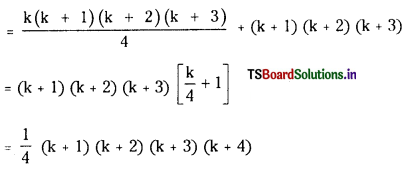
∴ S(n) is true for n = k + 1 also.
Hence by the principle of Mathematical Induction.
S(n) is true for ∀n ∈ N
∴ 1.2.3 + 2.3.4 + 3.4.5 + ……………. + n (n + 1) (n + 2) = \(\frac{n(n+1)(n+2)(n+3)}{4}\)
Question 14.
\(\frac{1^3}{1}+\frac{1^3+2^3}{1+3}+\frac{1^3+2^3+3^3}{1+3+5}\) + ……………… upto n terms = \(\frac{n}{24}\) (2n2 + 9n + 13). (Mar. 14, 04, 05)
Answer:
The nth term of the given series is

![]()
Question 15.
12 + (12 + 22) + (12 + 22 + 32) + ……………. upto n terms = \(\frac{n(n+1)^2(n+2)}{12}\). (March 2012)
Answer:
Let S(n) be the statement and
nth term of series is 12 + 22 + 32 + ……………… + n2
∴ S(n) = 12 + (12 + 22) + (12 + 22 + 32) + ……… + (12 + 22 + 32 + ………………. + n2)
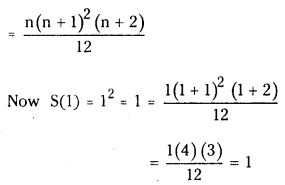
∴ S(n) is true for n = 1.
Suppose S(n) is true for n = k then
12 + (12 + 22) + (12 + 22 + 32) + ……… + (12 + 22 + 32 + ………………. + k2) = \(\frac{k(k+1)^2(k+2)}{12}\)
Now we have to prove that S(k + 1) is true.
So 12 + (12 + 22) + (12 + 22 + 32) + ……… + (12 + 22 + 32 + ………………. + k2) + (12 + 22 + 32 + ……………. + k2 + (k + 1)2
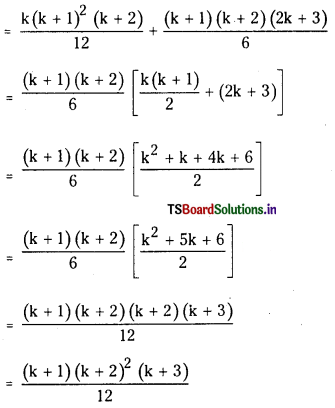
∴ The statement S(n) hold for n = k + 1 also
∴ By the principle of Mathematical Induction S(n)is true ∀n ∈ N.
∴ 12 + (12 + 22) + (12 + 22 + 32) + (12 + 22 + 32 + …………… + n2) = \(\frac{\mathrm{n}(\mathrm{n}+1)^2(\mathrm{n}+2)}{12}\)